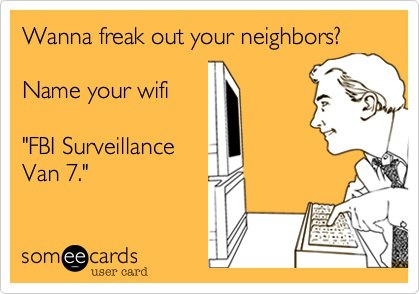Exploring the impact of broadband and technology on our lives, our businesses, and our communities.
The Gigabit Community attracts young people
This Chicago Business article demonstrates perfectly why communities need to be able to offer affordable Gigabit access in residential homes and apartments. If you want young people, business from home entrepreneurs, and work from home employees (almost everyone works part time from home now), Gigabit services gets you noticed.
Technology News:
Google changes terms of service
Wired reports that Google has changed its position on net neutrality. The search giant has apparently told the FCC that it may not allow residential customers on its Google Fiber networks to attach servers to their home fiber connection. The company is suggesting that instead, customers that want to run a server will be encouraged to purchase a "business class" service that costs more.
It makes sense to charge more for the symmetric bandwidth that is usually required to run a server efficiently, but on our open access, multi-service networks, we don't find it useful to try to control what customers do; it turns both the service providers and the network owner (typically a community enterprise) into bandwidth police, and forces the network owner to be judge and jury about what might constitute "business" use of a fiber connection.
Instead, we develop pricing models that focus on user needs, which lets the customers choose if they want a residential service or a business class service, and takes providers and the network owner off the hook for judging what their customers are doing. And not incidentally, that policy approach encourages innovation and entrepreneurship in the community by keeping the cost of starting an Internet-based business very low.
Technology News:
Death of TV: Part XXXIX:70% of those under 35 are using online video
This short article from Fiber to the Home Council pretty much tells you everything you need to know about why communities need Gigabit broadband. In a survey of 2000 households in North America, 70% of those under 35 years of age are using over the top (OTT) video services like Netflix and Hulu, just two of the rapidly proliferating companies providing OTT video.
Even more interesting is that the survey shows the average broadband household has at least FIVE Internet connected devices...and so you have to design the network to support the possibility that all five devices are having video streamed to them at the same time.
Finally, half of the group under 35 have never bought any traditional package of cable/satellite TV.
Repeat and rinse as often as necessary...
TV is dead.
TV is dead.
TV is dead.
TV is dead....you get the idea.
Technology News:
Knowledge Democracy:
What communities risk by putting off broadband investments
Fred Pilot excerpts two key points from a speech by Milo Medin, the head of the Google fiber initiative.
- Communities are still putting off taking control of their economic future...despite more than a decade of waiting for the private sector or the Federal government to do something.
- Many communities have a blind faith in wireless...that if they wait long enough, a "breakthrough" wireless technology will save them the effort of investing in duct and fiber. Medin makes the point I have made many times, which is you can't expand wireless without lots of fiber.
Read Pilot's summary, and he also links to Medin's full speech.
Technology News:
Design Nine's New Hampshire FastRoads project is coming online
Design Nine's FastRoads project is about to come online. We are currently expecting this community-owned Gigabit fiber network to start with four service providers. Design Nine has been working with the 43 FastRoads towns for more than six years, and we did the early planning, the financial modeling, helped write the grant, designed and built the network, and through our new subsidiary, WideOpen Networks
The initial FastRoads network brings makes twenty-two New Hampshire towns "Gigabit Cities," with Gig services available in every community. Two of the twenty-two towns are getting fiber to the home services to more than a thousand premises. Planning to add more communities is already underway.
For more information on FastRoads, check out this article:
http://www.bbpmag.com/2013mags/may-june/BBC_May13_FastRoads.pdf
For more information on WideOpen Networks, visit our Web site:
http://www.wideopennetworks.us
Newsletter:
How to work from home (or remotely)
Here is a great article on how to manage people working remotely. This article has very specific and useful tips on what you need to do, what software tools you should use, and provides links to some of the recommended tools. We have been using this approach very successfully for years, and the two most important things we have found are:
- Videoconferencing that is easy to use and can be "always on" or nearly always on. This means Skype or some other one-click video tool, rather than something like Webex or GoToMeeting. We use GTM all the time, but you have to go through a dialogue to set up a videoconference with Webex and GTM, and the overhead is too high for remote collaboration.
- Good symmetric bandwidth at every worker's location. This means if you have someone working remotely from their home, they need business class broadband with a minimum of several meg of upload bandwidth. You need symmetric bandwidth to support the videoconferencing.
There are a variety of collaboration and project management tools, and you need something, but the minimum requirement will be a tool that can be accessed remotely so that all employees can easily keep project activities up to date.
Technology News:
Creative Destruction: The end of the cash register

The Square Stand converts an iPad into a full-featured cash register and credit card scanner. The cash register business started dying in the eighties, and I've been to the site of the National Cash Register company in Dayton, Ohio. The massive complex that built cash registers for most of the twentieth century is mostly gone. Where huge warehouses and assembly lines stood, the University of Dayton marching band (the Pride of Dayton) now rehearses their half time routines. And the last NCR building is now a classroom complex for the University of Dayton.
We so often hear about the jobs lost through "automation" and "computers," but the news media usually fails to point out all the new businesses being created. Apple is now a major supplier of "cash registers," along with companies like Square. NCR failed to adapt, and the free market rewarded the companies that did change and adjust to new technology with growth and new jobs. The "record" business, including CDs, is nearly dead, but the "iPod" business has spawned thousands of new businesses and hundreds of thousands of new jobs.
Technology News:
Privacy: It's all gone
Facebook and LinkedIn now appear to be exchanging subscriber information, as I just received a Facebook email suggesting that I friend two business associates. The only way Facebook could know I have any relationship with these people is if Facebook had access to LinkedIn subscribers. I only use Facebook for close family and a few friends, so Facebook could not have made the connection with these people (one of whom is in Asia) by doing a second and third degree of separation search. While the NSA data collection is troubling, we need to keep in mind that all the "free" services like Facebook and LinkedIn are "free" only because we give them permission to sell/give away/distribute our personal information. Anyone who complains that Facebook is giving personal information to the NSA is forgetting that you already gave them permission to do that when you asked for a "free" subscription.
Technology News:
Knowledge Democracy:
U.S. Broadband: Almost as good as Russia!
Long time readers will recognize a running joke in the title of this post. Here is a very brief note indicating that fiber is being aggressively deployed in Russia. Meanwhile, in the U.S., we're being told:
- Cellular wireless will solve all our broadband problems....bandwdith caps? What are bandwidth caps?
- VDSL will solve all our problems.....all the phone companies are abandoning their copper cable plant? What does that have to do with anything?
- DOCSIS 3.0 will solve all our problems.....10:1 asymmetric bandwidth? Why is that an issue? You shouldn't be working from home anyway.
So take your choice, and if you need more bandwidth, maybe moving to Russia could be just the ticket.
